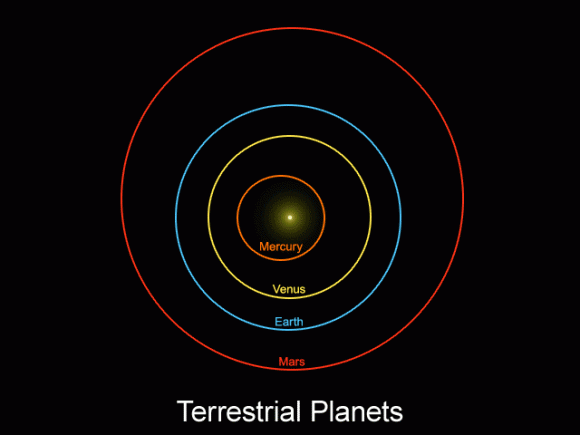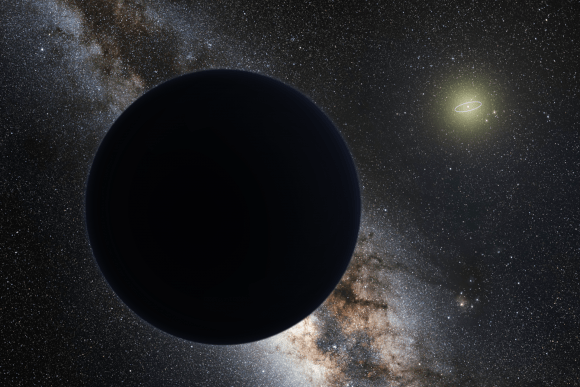[embed]
At this point, I think the astronomy textbook publishers should just give up. They'd like to tell you how many planets there are in the Solar System, they really would. But astronomers just can't stop discovering new worlds, and messing up the numbers.
Things were simple when there were only 6 planets. The 5 visible with the unaided eye, and the Earth, of course. Then Uranus was discovered in 1781 by William Herschel, which made it 7. Then a bunch of asteroids, like Ceres, Vesta and Pallas pushed the number into the teens until astronomers realized these were probably a whole new class of objects. Back to 7.
Then Neptune in 1846 by Urbain Le Verrier and Johann Galle, which makes 8. Then Pluto in 1930 and we have our familiar 9.
But astronomy marches onward. Eris was discovered in 2005, which caused astronomers to create a whole new classification of dwarf planet, and ultimately downgrading Pluto. Back to 8.
It seriously looked like 8 was going to be the final number, and the textbook writers could return to their computers for one last update.
[caption id="attachment_126972" align="alignright" width="580"]
A predicted consequence of Planet Nine is that a second set of confined objects should also exist. These objects are forced into positions at right angles to Planet Nine and into orbits that are perpendicular to the plane of the solar system. Five known objects (blue) fit this prediction precisely.
Credit: Caltech/R. Hurt (IPAC) [Diagram was created using WorldWide Telescope.][/caption]Astronomers, however, had other plans. In 2014, Chad Trujillo and Scott Shepard were studying the motions of large objects in the Kuiper Belt and realized that a large planet in the outer Solar System must be messing with orbits in the region.
This was confirmed and fine tuned by other astronomers, which drew the attention of Mike Brown and Konstantin Batygin. The name Mike Brown might be familiar to you. Perhaps the name, Mike "Pluto Killer" Brown? Mike and his team were the ones who originally discovered Eris, leading to the demotion of Pluto.
Brown and Batygin were looking to find flaws in the research of Trujillo and Shepard, and they painstakingly analyzed the movement of various Kuiper Belt Objects. They found that six different objects all seem to follow a very similar elliptical orbit that points back to the same region in space.
All these worlds are inclined at a plane of about 30-degrees from pretty much everything else in the Solar System. In the words of Mike Brown, the odds of these orbits all occurring like this are about 1 in 100.
[caption id="attachment_127832" align="alignright" width="580"]
Animated diagram showing the spacing of the Solar Systems planet's, the unusually closely spaced orbits of six of the most distant KBOs, and the possible "Planet 9". Credit: Caltech/nagualdesign[/caption]
Instead of a random coincidence, Brown and Batygin think there's a massive planet way out beyond the orbit of Pluto, about 200 times further than the distance from the Sun to the Earth. This planet would be Neptune-sized, roughly 10 times more massive than Earth.
But why haven't they actually observed it yet? Based on their calculations, this planet should be bright enough to be visible in mid-range observatories, and definitely within the capabilities of the world's largest telescopes, like Keck, Palomar, Gemini, and Hubble, of course.
The trick is to know precisely where to look. All of these telescopes can resolve incredibly faint objects, as long as they focus in one tiny spot. But which spot. The entire sky has a lot of tiny spots to look at.
[caption id="attachment_127802" align="alignright" width="580"]
Artist's impression of Planet Nine, blocking out the Milky Way. The Sun is in the distance, with the orbit of Neptune shown as a ring. Credit: ESO/Tomruen/nagualdesign[/caption]
Based on the calculations, it appears that Planet 9 is hiding in the plane of the Milky Way, camouflaged by the dense stars of the galaxy. But astronomers will be scanning the skies, and hope a survey will pick it up, anytime now.
But wait a second, does this mean that we're all going to die? Because I read on the internet and saw some YouTube videos that this is the planet that's going to crash into the Earth, or flip our poles, or something.
Nope, we're safe. Like I just said, the best astronomers with the most powerful telescopes in the world and space haven't been able to turn anything up. While the conspiracy theorists have been threatening up with certain death from Planet X for decades now - supposedly, it'll arrive any day now.
But it won't. Assuming it does exist, Planet 9 has been orbiting the Sun for billions of years, way way out beyond the orbit of Pluto. It's not coming towards us, it's not throwing objects at us, and it's definitely not going to usher in the Age of Aquarius.
Once again, we get to watch science in the making. Astronomers are gathering evidence that Planet 9 exists based on its gravitational influence. And if we're lucky, the actual planet will turn up in the next few years. Then we'll have 9 planets in the Solar System again.
 Universe Today
Universe Today

![A predicted consequence of Planet Nine is that a second set of confined objects should also exist. These objects are forced into positions at right angles to Planet Nine and into orbits that are perpendicular to the plane of the solar system. Five known objects (blue) fit this prediction precisely. Credit: Caltech/R. Hurt (IPAC) [Diagram was created using WorldWide Telescope.]](/article_images/p9_kbo_extras_orbits_2_1-580x326.jpg)

